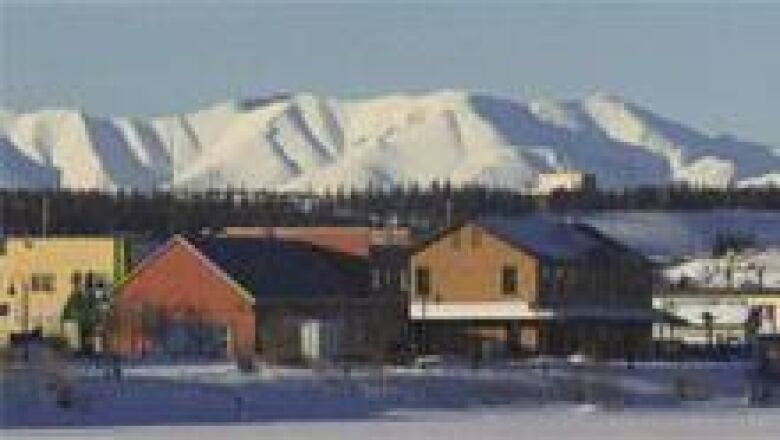Whitehorse housing crisis sparks potential solutions
Whitehorse city officials and the local First Nation are proposing ways to encourage residential development, amid mounting concerns about a severe lack of housing.
Concerns about Whitehorse's housing shortage attracted 65 people to a forum Monday night to discuss possible solutions, such as converting vacantbuildings into emergency housing and making more land available for residential use.
Whitehorse city planners say they are proposing tax incentives to entice property owners to develop new housingon emptylots within the downtown area.
Under the city's proposal, eligible projects could qualify for tax rebates of:
- Up to $10,000 for new "garden suites" built on existing residential properties.
- Up to $50,000 for new multi-family units.
- Up to $500,000 for major developments that are over $1 million.
City planning manager Mike Gau said the financial incentives would offset demolition and dumping costs for some of the older buildings that could be replaced with residential properties.
"If you look at the old Boys and Girls Club behind the Qwanlin Mall, [there is] probably a significant tipping fee cost to demolish that building, but [it] could be an excellent spot for a mixed-use development," Gau told CBC News Monday.
Gau said officials are targeting 22 downtown properties under the proposed plan, including the former Canadian Tire building. The tax rebate strategy has proven to be effective in other Canadian centres, he said.
"We're really trying to encourage the rental market as well, so if you can provide 10 units for a minimum of 10 years, the city will grant up to half a million dollars back in taxes resulting from those improvements," Gau said.
"Key to all of this is that this doesn't cost taxpayers any money, as these are taxes that we're not collecting now," he added. "In fact, this should spur on development and generate new taxes."
City council is expected to vote on the proposed incentive plan next week.
First Nationoffers land
Meanwhile, the Kwanlin Dun First Nation in Whitehorse says it has a parcel of land, adjacent to Northland Trailer Park, that could be turned into an apartment building or multi-family lots.
"We would like to be part of the solution," said Chief Rick O'Brien. "We have some land within the city of Whitehorse that we could potentially look at developing a high-density apartment building or something."

O'Brien said the project could be funded with some of the $16 million in funding left in Yukon's portion of the Northern Housing Trust. The chief said he has yet to hear back from Yukon Premier Darrell Pasloski on the idea.
Whitehorse has long faced a serious housing shortage, despite a growing economy spurred by a booming mining sector.
The city's vacancy rate was just 1.2 per cent as of last month, according to the Yukon government's latest rental survey.
A report released by the Yukon Anti-Poverty Coalition earlier this year said Whitehorse's emergency homeless facilities, including the Salvation Army shelter and Kaushee's Place transition home, are regularly full or near capacity.
Those who attended Monday night's housing forum, organized by Yukon NDP Leader Liz Hanson, suggested converting the old Canadian Tire building or the soon-to-be-vacant Klondike Inn into emergency housing.
Yukon Anti-Poverty Coalition chairman Bill Thomas stressed that the city's homeless desperately need help.
"We're back to the same situation that we were [in] last year, and the year before, and the year before," Thomas told the audience. "Pay attention. This is serious."
Homeless women in particular can face some ugly choices when it comes to finding a place to live, said Charlotte Hrenchuk of the Yukon Status of Women Council.
"Women get themselves to detox, they get themselves to jail, they find someone to shack up with for the winter, they trade sexual favours for a place to stay," she said.
Businesses affected by shortage: chamber
Rick Karp, president of the Whitehorse Chamber of Commerce, said 78 per cent of local businesses that were recently surveyed said they have had trouble attracting new employees because of the city's housing shortage.
"We were shocked 48.3 per cent of the business community had employees who were in difficulty with housing," Karp added.
Thomas said the Northern Housing Trust funding could be put to good use by government.
"Let's get creative. Let's get some pocket housing in here," he said.
"Pocket housing is these multi-occupancy units that have, you know, four or five units in them; average space [is] maybe 230 square feet. We can build those with some of that money."
Hanson is urging all of Yukon's three political parties to get together and find a solution before the winter begins.












_(720p).jpg)


 OFFICIAL HD MUSIC VIDEO.jpg)
.jpg)



























































































